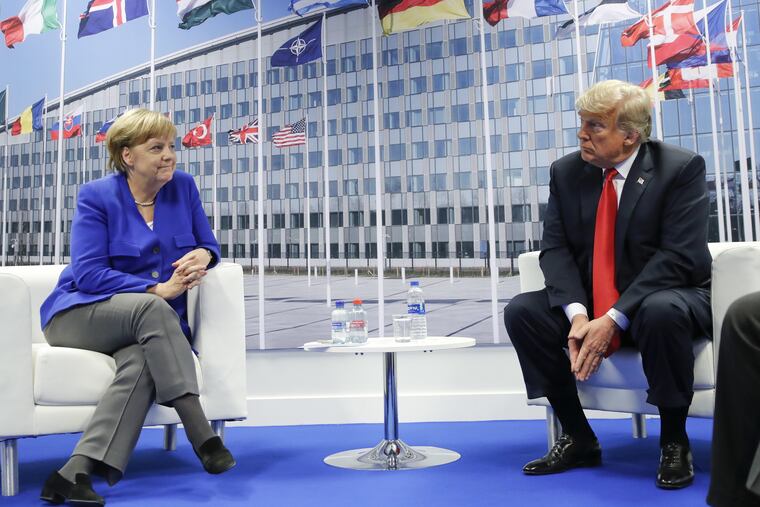Trump does Putin’s dirty work at NATO summit | Trudy Rubin
Donald Trump is doing Putin's dirty work, and no one has been willing or able to make him stop.

No sooner did President Trump arrive at the NATO summit in Brussels than he launched a tirade at one of our closest allies, declaring, "Germany is totally controlled by Russia."
That ludicrous charge is based on a usual Trump stew of fake facts mixed with demagoguery. But it raises an unavoidable question prior to Trump's meeting with Vladimir Putin on July 16.
Is the U.S. president totally controlled by Russia? Is he a "Manchurian Candidate," brainwashed or blackmailed by Putin into helping the Kremlin weaken America? So far I've avoided conspiracy theories and still believe the president is brainwashing himself with a mindset that prefers dictators to democrats and views alliances as burdens.
Yet either way, the result is the same. Donald Trump is doing Putin's dirty work, and no one has been willing or able to make him stop.
So let us count the ways in which Trump is gifting Putin when it comes to NATO.
1. Undermines support for NATO in U.S.
First, in spewing false facts about NATO (while insisting "Putin is fine"), Trump undermines support for the alliance on the home front. A recent Economist survey found just 40 percent of Republicans think the United States should stay in NATO, while 56 percent of Republicans consider Trump's relationship with Putin good for America.
2. Hurts U.S. alliance with Germany
Those same fake facts create cracks in the alliance and smiles in the Kremlin. Let's start with the claim that Germany is "totally controlled by Russia" based on another false Trump "fact" — that Berlin gets 70 percent of its energy from Russia.
Yes, Germany gets more than half its natural gas from Russia, but only 20 percent of its energy supplies come from gas. And it is nuts to claim Germany is under Russia's thumb when Chancellor Angela Merkel has been the most outspoken European leader in standing up to Putin. The president's real pique with Germany is that it won't t buy expensive liquefied gas from the U.S. but supports the building of a new commercial gas pipeline from Russia.
3. Weakens NATO solidarity
Trump's claim that the U.S. pays for "90 percent of NATO spending " is false and destructive. The U.S. pays only 22 percent of the common NATO budget, according to a formula based on national income. No NATO member is in arrears.
The president's mixes up "NATO spending" with a NATO goal that each of the 29 members spend at least 2 percent of GDP on its own defense by 2024 (eight will do so in 2018). Washington spends 3.57 percent of its GDP on its own defense, but most of that money goes for U.S. security in Asia. Yet Trump uses that figure to falsely allege that NATO members owe Washington billions.
In the final absurdity, the president demanded in Brussels that members double their defense spending to 4 per cent of GDP, a greater percentage than the U.S. superpower spends. Trump knows well this is an impossible target. He might as well tell NATO: Drop dead.
Had he been looking for a win, Trump could have taken credit for a steady increase in NATO members' defense spending since he took office. Trump "could easily be proclaiming victory and talking about how he himself, he alone, had transformed the alliance," says Stephen Sestanovich, a longtime Russia expert at the Council on Foreign Relations. "Instead he seems intent on being the disrupter."
James Goldgeier, a fellow at the council and former dean of the School of International Service at American University, adds a key point: "Whereas previous presidents have complained about lagging spending, they didn't make it their singular obsession."
4. Threatens the future of NATO
In his biggest gift to Putin, Trump sees America's key security alliance only in terms of dollars. This is light years from the way Ronald Reagan viewed NATO in 1982, when he said in Germany: "What unites us is much more meaningful and deeper than any differences that might exist."
Yes, times have changed and Russia is no longer the same kind of threat.
Yet Putin has made clear over and over his determination to undermine Western democracies. That's why a unified stand at this summit – against Russian cyber-hacking, invasions of neighbors, poisonings abroad, and Kremlin threats to NATO members – was so important. (Even the U.S. Senate, so disunified on everything, voted by 97-2 for a motion of support for NATO on Tuesday.)
No unified NATO stand is possible, however, with Trump. Instead, in the words of German commentator and Brookings Institution fellow Constanze Stelzenmuller, we get the president's "open contempt for representative democracy … and his admiration for autocrats and dictators. This, not defense spending or pipelines, is the new fault line in the alliance today and the greatest in its history."
Trump's is the pricey gift to the Kremlin that keeps on giving. The future of NATO is at stake.